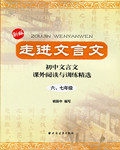题目内容
The workers were working from 7:00 a.m. to 7:00 p.m. that day, only ____ once at noon to have their lunch.
A. to stop B. stopping
C. to have stopped D. having stopped
练习册系列答案
 走进文言文系列答案
走进文言文系列答案
相关题目
题目内容
The workers were working from 7:00 a.m. to 7:00 p.m. that day, only ____ once at noon to have their lunch.
A. to stop B. stopping
C. to have stopped D. having stopped
 走进文言文系列答案
走进文言文系列答案